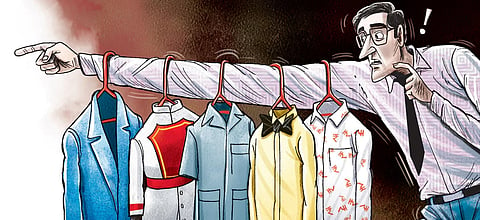

The COVID-19 crisis has brought out the best in civil servants. The youngsters in the field are putting in their heart and soul to grapple with this unprecedented pandemic. There is no dilemma in a crisis. The challenge is to keep this focus and commitment going over the remaining part of their career.
There is indeed a lot of energy and enthusiasm amongst officers when they join the service and in the initial years. They are willing to learn. They are keen on delivering. However, once the initial flush dies down and they look around, they soon start wondering which path to pursue. As they move up the ladder, the enthusiasm gets considerably reduced.
The young officer gets to know that, by and large, the public perceives a typical bureaucrat as inefficient. Despite the fact that a majority of the officers are great performers, they are, more often than not, part of the invisible lot. The public also believes that most bureaucrats are dishonest. Unfortunately, a number of bureaucrats themselves believe that, apart from them, the rest are corrupt.
The young civil servant soon discovers that it pays to be politically correct. He sees that endorsing the views of political masters is rewarding in terms of future career prospects. There are, however, a number of bureaucrats who are forthright and believe in expressing their opinion even if it means transfers or harassment, including suspension.
Some bureaucrats do behave as if they are not civil servants but true servants of the ‘master’ they serve. Their commitment to the master is an embarrassment to the rest of the bureaucracy. More so because the ‘master’ expects similar servility from other bureaucrats and, when it is not forthcoming, the ‘unaccommodating’ bureaucrat is shown the door.
Haughtiness and supercilious behaviour were attributes of ‘brown sahibs’. In a climate of total domination by the political master and the absence of self-respect amongst some bureaucrats, these ‘virtues’ are a preserve of those who appear totally spineless before the powers-that-be but choose to roar and bite spitefully when they interact with lesser mortals. Fortunately, such specimens are few and far between; but being highly visible, they create a doubt in the mind of a young entrant.
The young civil servant also witnesses another set of bureaucrats who may, at some point of time, be lying in cold storage though they are extremely competent, decisive, disciplined and helpful. When the market demand is for the pliable and the corrupt, they prefer to remain in hibernation.
Given the nature of the selection process, there would rarely be a grossly incompetent civil servant. However, what baffles the new entrant is that some who are competent are withdrawn and reticent, irrespective of the circumstances. Perhaps this indifference enables them to lead a blissful existence. But there are those who are always alert, optimistic and looking for opportunities even in the gloomiest of circumstances.
As the officers go out of the Academy into the hurly-burly of administration, they witness their seniors in all hues, shapes and sizes. They also discover that many who are getting rewarded aren’t the ones who actually perform. Many moving up the ladder are often the ones who have taken no risk, done precious little, not stood by their subordinates but have mastered the art of keeping the ‘right’ persons on the right side.
As against these movers and shakers, they see the likes of Harish Chandra Gupta, former Coal Secretary, who enjoyed the reputation of being honest to the core, going through the trauma of facing trial for corruption and being convicted. They look at P C Parakh, also former Coal Secretary, who was harassed by the enforcement agencies despite taking the initiative to bring to light the wrongs prevailing in the messy coal sector and being a whistle-blower. The list of honest and efficient officers who suffer is unending.
Civil servants getting caught in the political crossfire is nothing new, but this creates a dilemma in the minds of young officers. Their hearts would want to perform and deliver but their minds would tell them to beware of the risks associated with honest performance. They start believing it may not get rewarded. They wonder if they should also master the art of being servile to those who matter and learn how to become ‘visible’ through glamour, without doing much so they would not commit mistakes. Once this doubt enters their mind, they either learn the tricks of the trade or become useless. In either case, they consider themselves safe. For some young recruits, the issue gets settled pretty quickly.
However, for many, this dilemma continues for the better part of their career. They look at the likes of T N Seshan and Julio Ribeiro for inspiration. These were honest and efficient officers and did well in their careers, but there is a lurking fear about the consequences that other honest officers faced and continue to face.
There is another set of officers who are financially honest but do nothing. They do greater damage to the system by being intellectually dishonest. These officers couldn’t care less if the institutions and the organisations they head went to the dogs so long as they can project their own image and keep climbing the bureaucratic ladder.
Bureaucrats evolve in different ways, presenting several shades. This confuses the young officer during the early part of his career. He has a choice but unfortunately, that itself is the dilemma.
Anil Swarup
Former Secretary, School Education and Literacy, GoI
(With excerpts from the author’s forthcoming book Ethical Dilemmas of a Civil Servant.)
(Email: swarup8@yahoo.com)